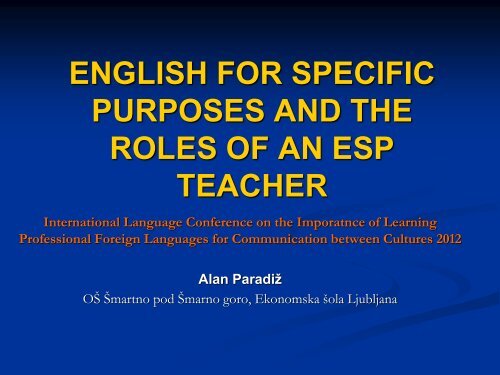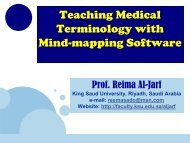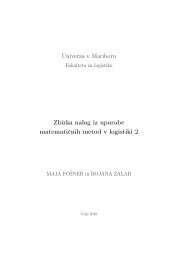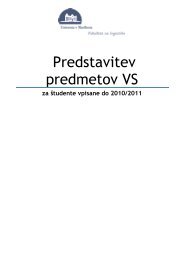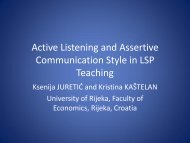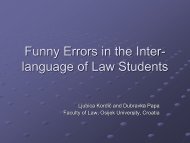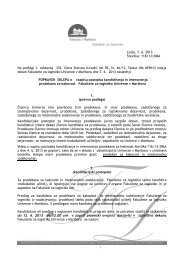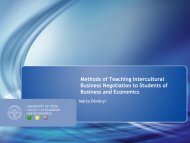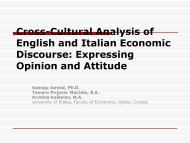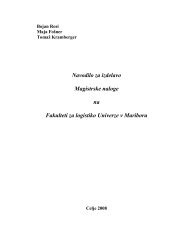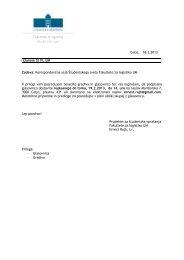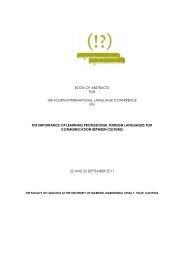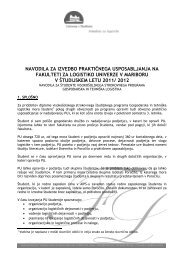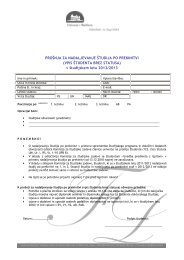english for specific purposes and the roles of an esp teacher
english for specific purposes and the roles of an esp teacher
english for specific purposes and the roles of an esp teacher
You also want an ePaper? Increase the reach of your titles
YUMPU automatically turns print PDFs into web optimized ePapers that Google loves.
ENGLISH FOR SPECIFIC<br />
PURPOSES AND THE<br />
ROLES OF AN ESP<br />
TEACHER<br />
International L<strong>an</strong>guage Conference on <strong>the</strong> Imporatnce <strong>of</strong> Learning<br />
Pr<strong>of</strong>essional Foreign L<strong>an</strong>guages <strong>for</strong> Communication between Cultures 2012<br />
Al<strong>an</strong> Paradiž<br />
OŠ Šmartno pod Šmarno goro, Ekonomska šola Ljublj<strong>an</strong>a
Content<br />
- Emergence <strong>of</strong> English <strong>for</strong> Specific Purposes<br />
- ESP vs. General English<br />
- Roles <strong>of</strong> <strong>an</strong> ESP Teacher who, what, how?<br />
- Wrap up
The Emergence <strong>of</strong> ESP<br />
- 1960s a shift in traditional underst<strong><strong>an</strong>d</strong>ing <strong>of</strong><br />
linguistics<br />
- different situations/ learners’ needs “different,<br />
<strong>specific</strong>” l<strong>an</strong>guage <strong><strong>an</strong>d</strong> teaching approaches<br />
- The emergence <strong>of</strong> English <strong>for</strong> Specific Purposes to<br />
meet <strong>specific</strong> needs <strong>of</strong> a learner
ESP vs. General English<br />
Differences between ESP <strong><strong>an</strong>d</strong> GE (Dudley-Ev<strong>an</strong>s):<br />
- meet <strong>specific</strong> needs<br />
- it serves a particular discipline<br />
- intermediate/adv<strong>an</strong>ced level ( au<strong>the</strong>ntic<br />
materials are easily feasible)<br />
- (Carter) “turning learners into users” “selfdirected”<br />
learning<br />
-ESP stems from GE, it’s “[…] <strong>an</strong> approach to<br />
l<strong>an</strong>guage teaching in which all decisions as to<br />
content <strong><strong>an</strong>d</strong> method are based on <strong>the</strong> learner’s<br />
reason <strong>for</strong> learning” (Hutchinson).
-<br />
Major differences? Not really.
GE Teacher facing ESP<br />
- No training <strong>for</strong> ESP teaching frustration, a<br />
feeling <strong>of</strong> inadequacy<br />
- Possessing <strong>the</strong> knowledge to generate<br />
communication with ESP learners<br />
- Becoming consult<strong>an</strong>ts, negotiators with students <br />
additional <strong>roles</strong>
Areas to take into consideration<br />
1. Content <strong>of</strong> <strong>the</strong> ESP materials <strong><strong>an</strong>d</strong> <strong>the</strong> level <strong>of</strong> <strong>the</strong>ir<br />
specialisation<br />
2. Reasons <strong>for</strong> EL Teachers to struggle with ESP<br />
3. The <strong>roles</strong> <strong>of</strong> <strong>an</strong> ESP <strong>teacher</strong>
1. Content <strong>of</strong> ESP Materials<br />
- Little lingustic justification <strong>for</strong> highly specified texts<br />
(i.e. au<strong>the</strong>ntic texts)<br />
- Specialized, technical terms internationally used<br />
no crucial comprehension barrier<br />
Hullen: “it is not <strong>the</strong> usage <strong>of</strong> technical term per se<br />
that distinguishes l<strong>an</strong>guage <strong>for</strong> special <strong>purposes</strong><br />
from general l<strong>an</strong>guage, but <strong>the</strong> factual knowledge<br />
necessary to underst<strong><strong>an</strong>d</strong> <strong>the</strong>se words.”<br />
<strong>teacher</strong>’s knowledge!
Why au<strong>the</strong>ntic texts?<br />
- face validity <strong><strong>an</strong>d</strong> familiarity a students’ need<br />
- relev<strong>an</strong>cy students’ motivation<br />
- no teaching value if not chosen/exploited wisely<br />
a <strong>teacher</strong>’s competence to choose <strong>the</strong> right<br />
texts (or provide <strong>the</strong>ir own material) to generate <strong><strong>an</strong>d</strong><br />
boost l<strong>an</strong>guage acquistion
2. Why do <strong>teacher</strong>s struggle with ESP?<br />
- No (re)training<br />
- No need to learn specialist subject area<br />
- Need to underst<strong><strong>an</strong>d</strong> basic principles, have a<br />
positive attitude towards ESP content<br />
- Need to “become interested students <strong>of</strong> a subject<br />
matter”<br />
- Need to use particular jargon, use more generalized<br />
set <strong>of</strong> academic skills, know everyday small talk<br />
(general communication skills)<br />
a common fund <strong>of</strong> knowledge
3. The <strong>roles</strong> <strong>of</strong> <strong>an</strong> ESP <strong>teacher</strong><br />
Research<br />
Teaching<br />
Evaluation<br />
?<br />
ESP<br />
Practitioner<br />
Needs<br />
<strong>an</strong>alysis<br />
Collaboration,<br />
negotiation<br />
Materials<br />
development<br />
Syllabus<br />
design
Conclusion<br />
- little justification <strong>for</strong> higly specified materials, but<br />
a must have<br />
- readiness to accommodate, negotiate, collaborate<br />
- <strong>an</strong> unknown field to teach in but much<br />
knowledge (<strong><strong>an</strong>d</strong> right approaches) already<br />
brought along


